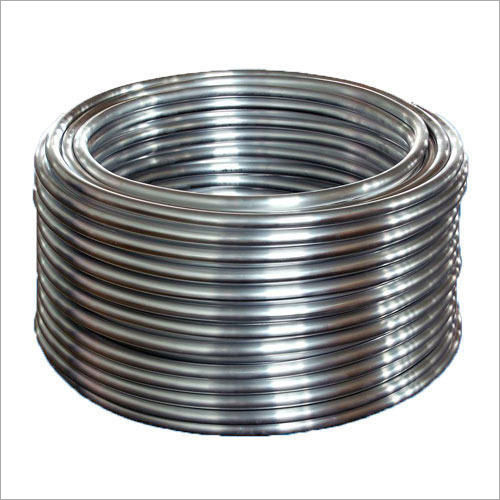

Aluminum Alloy Magnesium Wires
100 INR/Kilograms
Product Details:
- Product Type Wire
- Material Aluminum Alloy
- Usage Industrial
- Size Standard
- Color Silver
- Warranty Yes
- Click to view more
X
Aluminum Alloy Magnesium Wires Price and Quantity
- 100 INR/Kilograms
- 100 Kilograms
Aluminum Alloy Magnesium Wires Specification
- Industrial
- Wire
- Standard
- Yes
- Silver
- Aluminum Alloy
Aluminum Alloy Magnesium Wires Trade Information
- 7 Days
Product Description
Aluminium Alloy Magnesium Wires are suitable for overhead cable installation purpose. These are also used for designing stranded conductor, single conductor, cable conductor etc. Length of such wires ranges between 0.115 mm to 9.50 mm. Advanced smelting and annealing technique has been followed to design such metal wires. Approximate melting temperature of these Aluminium Alloy Magnesium Wires ranges between 574 degree C to 638 degree C. Density of such wires is around 2.64 g/cm3.Long lasting surface finish and optimum durability are their key aspects.
Aluminum Alloy Magnesium Wire Applications:
Aluminum alloy magnesium wires find various applications across different industries due to their unique properties and characteristics. Some of the key applications include:
1. Aerospace: The aerospace industry extensively uses aluminum alloy magnesium wires in the construction of aircraft components. These wires are utilized in the fabrication of aircraft frames, wings, fuselage panels, and other structural elements due to their lightweight yet strong nature. The high strength-to-weight ratio of these wires helps reduce overall aircraft weight, contributing to improved fuel efficiency.
2. Automotive: In the automotive industry, aluminum alloy magnesium wires are employed in manufacturing lightweight automotive parts. They are commonly used for creating body panels, engine components, and suspension parts, as they help reduce the vehicles weight, leading to better fuel economy and performance.
3. Marine: Aluminum alloy magnesium wires are utilized in marine applications for constructing boats, ships, and other watercraft. Their corrosion resistance properties make them well-suited for marine environments where exposure to saltwater can be a concern.
4. Bicycle and Sporting Goods: Bicycle frames, golf club shafts, tennis rackets, and other sporting goods often incorporate aluminum alloy magnesium wires. The combination of strength and lightness enhances the performance of these products, making them easier to handle and maneuver.
5. Building and Construction: Aluminum alloy magnesium wires are used in construction for various purposes, such as reinforcing concrete structures, manufacturing curtain walls, window frames, and roofing materials. Their corrosion resistance makes them suitable for outdoor and high-humidity environments.
6. Electrical Conductors: Aluminum alloy magnesium wires can be used as electrical conductors due to their relatively high electrical conductivity. They are employed in power transmission lines, electrical cables, and other electrical components.
7. Welding and Joining: These wires are utilized as filler materials in welding processes for joining aluminum alloy parts. Their compatibility with welding techniques makes them valuable in fabricating complex structures.
8. Consumer Electronics: Aluminum alloy magnesium wires can be found in the manufacturing of electronics and consumer goods, where weight reduction is essential. They may be used in the construction of laptops, smartphones, and other portable devices.
9. Renewable Energy: Aluminum alloy magnesium wires play a role in the renewable energy sector, particularly in the construction of solar panel frames and wind turbine components. Their lightweight nature facilitates easy installation and maintenance of renewable energy systems.
10. Heat Exchangers: Aluminum alloy magnesium wires are used in the production of heat exchangers due to their excellent thermal conductivity and corrosion resistance. These components are commonly employed in air conditioning systems, radiators, and automotive cooling systems.
FAQ:
Q. What are aluminum alloy magnesium wires?
Ans: Aluminum alloy magnesium wires are composite wires made by combining aluminum and magnesium to create a lightweight and strong material with improved mechanical properties. The addition of magnesium enhances the alloys strength and corrosion resistance.
Q. What are the typical applications of aluminum alloy magnesium wires?
Ans: These wires are commonly used in the aerospace, automotive, and construction industries. They are employed in manufacturing components like aircraft frames, automotive body parts, bicycle frames, and structural elements in buildings and bridges.
Q. What are the advantages of using aluminum alloy magnesium wires?
Ans: Aluminum alloy magnesium wires offer several benefits, including high strength-to-weight ratio, excellent corrosion resistance, good weldability, and low density. These properties make them ideal for applications requiring lightweight yet robust materials.
Q. Are there different grades of aluminum alloy magnesium wires available?
Ans: Yes, there are various grades of aluminum alloy magnesium wires available, each with specific alloy compositions and mechanical properties suited for different applications. The selection of the appropriate grade depends on the intended use and performance requirements.
Q. How are aluminum alloy magnesium wires manufactured?
Ans: The production of aluminum alloy magnesium wires involves melting aluminum and magnesium in specific proportions to achieve the desired alloy composition. The molten metal is then extruded or drawn through a die to form wires of various diameters. Afterward, the wires may undergo additional processes like heat treatment to optimize their mechanical properties.
Q. What is the tensile strength of aluminum alloy magnesium wires?
Ans: The tensile strength of aluminum alloy magnesium wires can vary depending on the specific alloy composition and processing. However, these wires generally exhibit higher tensile strength compared to pure aluminum wires.
Q. Can aluminum alloy magnesium wires be welded?
Ans: Yes, aluminum alloy magnesium wires are generally weldable. However, welding aluminum alloys requires specialized techniques and equipment, and proper procedures must be followed to avoid defects and maintain the desired mechanical properties.
Q. How do aluminum alloy magnesium wires resist corrosion?
Ans: The presence of magnesium in the alloy enhances its corrosion resistance. When exposed to the atmosphere, a thin oxide layer forms on the surface of the wire, protecting it from further corrosion.
Q. Are there any safety considerations when handling aluminum alloy magnesium wires?
Ans: Like any metalworking process, safety precautions should be taken when handling aluminum alloy magnesium wires. Safety measures may include wearing appropriate personal protective equipment (PPE) such as gloves and safety glasses, ensuring proper ventilation in the working area, and following safe handling practices to avoid injury.
Q. Where can I purchase aluminum alloy magnesium wires?
Ans: You can find aluminum alloy magnesium wires at specialized metal suppliers, industrial distributors, and online marketplaces. Be sure to source the wires from reputable suppliers to ensure product quality and consistency.
Precision Crafted for Industrial Performance
Our Aluminum Alloy Magnesium Wires are engineered for resilience and efficiency, tailored specifically for demanding industrial uses. The combination of aluminum alloy and magnesium enhances both strength and corrosion resistance, making these wires suitable for applications where reliability is paramount.
Trusted Supplier Across India and Beyond
As a leading exporter, importer, manufacturer, and supplier, we proudly deliver our high-quality aluminum alloy magnesium wires across India and internationally. Our commitment to quality and prompt service ensures our customers receive only the best products for their industrial requirements.
FAQs of Aluminum Alloy Magnesium Wires:
Q: How are Aluminum Alloy Magnesium Wires manufactured?
A: Aluminum Alloy Magnesium Wires are produced through processes such as melting, alloying aluminum with magnesium, casting, and wire drawing to achieve the standard size and desired mechanical properties, ensuring optimal conductivity and durability for industrial applications.Q: What are the main benefits of using Aluminum Alloy Magnesium Wires in industrial applications?
A: These wires provide excellent strength, flexibility, and corrosion resistance due to their unique alloy composition. They ensure longevity and consistent performance in industrial environments, making them a preferred choice for projects that demand high-quality and reliable wiring solutions.Q: When should I consider aluminum alloy magnesium wires over traditional aluminum wires?
A: You should opt for aluminum alloy magnesium wires when your application requires improved mechanical strength, enhanced resistance to corrosion, and better performance in challenging industrial conditions compared to standard aluminum wires.Q: Where can these wires be sourced in India?
A: Our company operates as an exporter, importer, manufacturer, and supplier of aluminum alloy magnesium wires in India. We serve clients nationwide as well as international customers, ensuring you receive authentic, high-quality wires regardless of your location.Q: What is the typical process involved in the installation of these wires?
A: Installation involves uncoiling the wire from spools, carefully routing and fastening the wires as required for the application, and using appropriate connectors to ensure secure electrical and mechanical connections. Observing industrial safety guidelines is essential during this process.Q: What warranty support is provided for Aluminum Alloy Magnesium Wires?
A: We offer warranty coverage on our aluminum alloy magnesium wires, assuring customers of the products quality and long-term durability. Warranty terms are provided at the time of purchase and vary depending on application and usage conditions.Tell us about your requirement

Price:
Quantity
Select Unit
- 50
- 100
- 200
- 250
- 500
- 1000+
Additional detail
Mobile number
Email
Other Products in 'Industrial Wires' category
 |
PRECISE ALLOYS PVT. LTD.
All Rights Reserved.(Terms of Use) Developed and Managed by Infocom Network Private Limited. |
 English
English Spanish
Spanish French
French German
German Italian
Italian Chinese (Simplified)
Chinese (Simplified) Japanese
Japanese Korean
Korean Arabic
Arabic Portuguese
Portuguese






